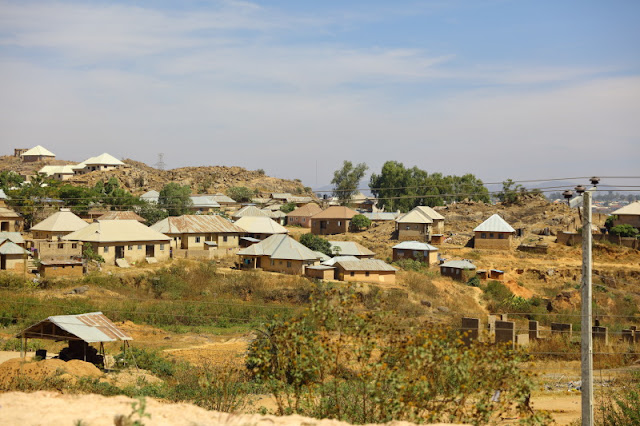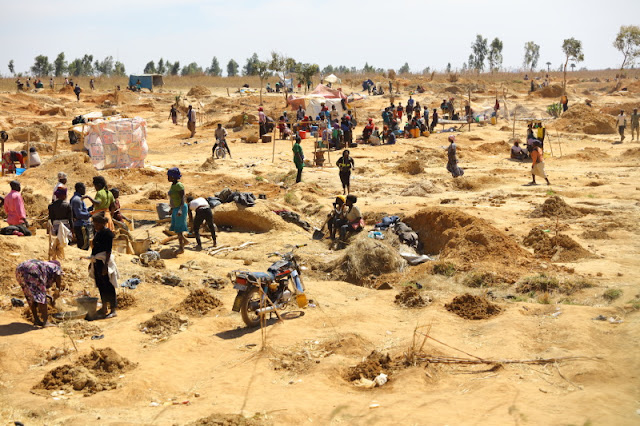 |
| once upon a time, the train came to Jos |
Unlike in Lagos, basic constructions are much more robust and covered by proper corrugated iron roofs often of pastel colors. This is perhaps a consequence of the cold temperatures that can freeze the plateau in winter time. Outside of villages, trees are rather rare, but their shape is visible miles around.
 |
| Jos is expanding |
There is a complex link between religion and tribes and between tribes and politics. Obviously, fellow tribesmen will rather support politicians from their own tribe because they will trust them more than someone from a different tribe and/or a different religion.
Politics is occasionally an effective lever for unrest when unhappy polititians feel they have a chance to upset the negative result of an election (rigged or not). Youth supporters can easily be manipulated into staging protests, which at times turn violent, either after having been persuaded they should fight for a rightful cause or after getting paid to do it as it happens everywhere. It is when violence flares up that communities will entrench themselves one against the other. Then religion or tribe belonging can easily be used as a rule of thumb to assess whether to kill or not to kill. The local election of 2008 is a good example of that pattern. Groups of young Muslims went protesting against the alledgedly rigged local election that showed the victory of a Christian candidate from People's Democratic Party. In their protest, violence started and they soon started to target Christian places like churches. Christian youth groups reacted as well by attacking mosques and burning the market where Hausa traders do their business.
Nowadays, tension are still palpable because of the envy generated by some newcomers doing better than early settlers. For instance traders, who are doing well in town, can afford to buy land off "indigenous people".
 |
| live- and sometimes contentious - stock |
Last century tin mining made the region prosper. Railway lines were connecting Jos to the rest of the country and made local production easily transportable to other parts of Nigeria. Presently the rails are handy for pedestrians because trains do not seem to come to Jos at all.
 |
| open-air mining, try your luck |
After the roundabout, we could see the density of urban sprawl increase. Jos is made of low buildings, maximum a storey or two, and is expanding rapidly to house the approximately half a million people living there over the hills surrounding the historic center of the town.
We had lunch in a Lebanese restaurant and then went on to APLORI, a research center for birds located 6km outside of town. The center is hosting students doing masters in ornithology at the University of Jos. Their piece of land contains a few hills, large trees and an expanse of bush which is propicious for birds to reproduce. Afan, our guide, took us for a tour within the hills. I was delighted by the scent of jasmin which grows in bushes. Many plants, like acacias, are full of thorns providing unexperienced wanderers in shorts with lacerating memories. We could see a few colourful flowers from pale velvety yellow to deep fuschia. The rocks made perfect hosts for brave trees able to fix their roots in small crevices and yet stand tall.
The next days we went to Shere Hills, which is under custody of the army, a few kilometers east of Jos. From the hills, the full size of Jos is visible. There is also a dammed lake that is used in the process of tin mining, as per Afan. Many orange-flowered trees, looking like large pomegranate flowers, lighted up the other colors of the vegetation.
Jos is known for its museum, which has a few Nok sculptures and a collection of artifacts from all over Nigeria. It has an outdoor "transportation" section which displays, under iron cages, a few old cars (like a Ford T) and train engines from the time trains were an practicable transport option. The museum is next to a zoo, which we were discouraged from visiting because its animals are in sorry conditions. Someone joked that the lion, that had managed to escape a few years ago and was subsequently killed for being labelled dangerous, was lucky to be able to avoid more suffering in his zoo-cage. Nonetheless the zoo and its park is appreciated by the local youth who come there to hang out together as it is the only park in town.
 |
| about to meet friends in the park |
Comments
Post a Comment